MENU
STIDS 2011 Home
About--
Topic list
Program Committee
Venue & Local info
Registration
Sponsors
Program--
Keynote Speakers
Tutorial
Agenda & Papers
Proceedings
Call for Papers
Important dates
Submission details
Download CFP
Attendees
C4I
Home

SEMANTIC
TECHNOLOGY FOR
INTELLIGENCE,
DEFENSE, AND
SECURITY
|
Bill Anderson |
Abstract:
Talk will focus on meta-level issues that concern semantic enhancement, specifically on issues of access control and provenance in the presence of semantic enhancement. The thesis is twofold:
(1) Without provenance, nobody will be willing to consume data because they won't trust it.
(2) Without access control, nobody will be willing to share data because they won't be confident it will be protected. Semantic enhancement relies to a great extent on scaling to large numbers of data sources. Without provenance and access control, the user base will not be large enough and thus there will be insufficient economic incentive to construct and maintain a robust system of semantic enhancement.
There are two interesting questions that arise. First, what do access control and provenance look like in a semantically-enhanced environment, and second, can ontology aid in the construction of well-founded provenance and access control mechanisms?
Short Bio:
Bill Andersen is the Chief Scientist at Highfleet (formerly Ontology Works), where he is responsible for product development direction and research. He is also one of the founders of the company. In 1998, he and three others left the federal government (NSA) to start what is arguably the first modern semantic technology company - Ontology Works. While at NSA, Bill worked as an analyst and in computer science research focusing on data fusion and semantic data integration. During that time, in the mid-90s, he was a graduate student in Computer Science at the University of Maryland College Park (UMCP), working in the laboratory that produced the prototypes of what would later become the Semantic Web.
Bill has degrees in Russian language and Computer Science from UMCP and has been a Visiting Scholar in Philosophy at Texas A&M University. He is currently completing his PhD at UMCP, focusing on security and provenance in deductive information systems. He is active in the semantic technology community, serving on the Editorial Board of Applied Ontology Journal and as one of the co-developers of the ISO Common Logic Standard.
|
Kathryn Laskey |
Abstract:
Sir Harold Jeffreys said: "Traditional or deductive logic admits only three attitudes to any proposition: definite proof, disproof, or blank ignorance." In the real world, definite proof or disproof is elusive and rare. Shades of gray are the norm. Decades of experience have demonstrated the power of combining Bayesian inference in a theoretically principled way with rich semantic domain representations. In a world rife with uncertainty, semantic representations must capture uncertainty if they are to be faithful to reality and useful in practice.
Short Bio:
Kathryn Blackmond Laskey is Associate Professor of Systems Engineering and Operations Research (SEOR) and Associate Director of the Center of Excellence in Command, Control, Communications, Computing and Intelligence (C4I Center). Her research focuses on extending traditional approaches to representing domain semanticsto address uncertainty, and applying Bayesian methods to automated support for multi-source fusion and situational awareness. She received her PhD degree in statistics and public policy from Carnegie Mellon University, MS in mathematics from the University of Michigan, and BS in mathematics from the University of Pittsburgh.
|
Tanya Malyuta |
Abstract:
Support, maintenance, and application/utilization of an incrementally growing semantic layer to large bodies of data in a consistent manner is a challenge. Special organization of this layer can help. Special approaches to data integration combined with simple non-imposing policies can help in addressing the problem of data silos.
Short Bio:
Tatiana Malyuta is the Principal Data Architect and Researcher of Data Tactics Corporation. Tanya has over 24 years of specialized IT experience and is a subject matter expert in database design and administration. She researches and implements integrated solutions for data processing and data solutions on the Cloud. She is an Associate Professor at the New York City College of Technology/CUNY. She received a Master's Degree with Honors in Applied Mathematics and a Ph.D. Degree in Computer Science from the State Polytechnic University in Lviv, Ukraine.
|
Barry Smith |
Abstract:
That semantic enhancement (the creation of an external incrementally growing ontology-based layer to be used for annotation of large bodies of intelligence data) can advance retrieval and analysis of data and overcome some of the familiar data silo problems, but that this must be done in a way that will avoid the creation of new, semantic silos.
Short Bio:
Barry Smith is a prominent contributor to both theoretical and applied research in ontology. He is the author of some 500 publications on ontology and related topics, and editor of The Monist: An International Quarterly Journal of General Philosophical Inquiry. His research has been funded by the National Institutes of Health, the US, Swiss and Austrian National Science Foundations, the US Department of Defense, the Volkswagen Foundation, and the European Union. In 2002 he received the 2 million Euro Wolfgang Paul Award of the Alexander von Humboldt Foundation. In 2010 he was awarded the first Paolo Bozzi Prize in Ontology by the University of Turin.
Smith is SUNY Distinguished Professor in the Department of Philosophy and Director of the National Center for Ontological Research and of the Center for Brain and Behavior Informatics in the University at Buffalo. He is also Adjunct Professor in the Departments of Neurology and of Computer Science.
SmithÕs pioneering work on the science of ontology led to the formation of the OBO (Open Biomedical Ontologies) Foundry, a set of resources designed to support information-driven research in biology and biomedicine. Smith is one of the principal scientists of the NIH National Center for Biomedical Ontology, a Scientific Advisor to the Gene Ontology Consortium, and a PI on the Protein Ontology and Infectious Disease Ontology projects.
